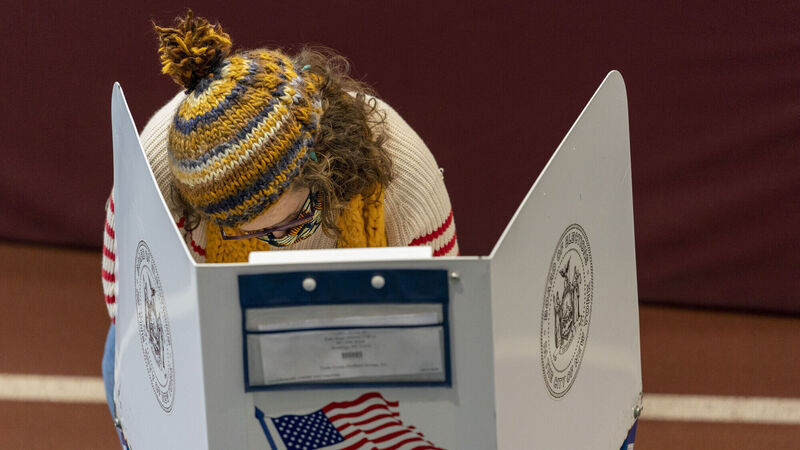US is braced for court battles over result of presidential election

A voter marks her ballot during early voting at the Park Slope Armory YMCA, on Tuesday, October 27, in Brooklyn, New York. Picture: Mary Altaffer/AP
The US presidential election has all the ingredients for a drawn-out court battle over its outcome — a highly polarised electorate, a record number of mail-in ballots, and some US Supreme Court justices who appear ready to step in if there is a closely contested race.
The only missing element that would send both sides to the courthouse would be a razor-thin result in a battleground state.
“If it comes down to Pennsylvania and Florida, I think we’ll be in the legal fight of our lives,” said Jessica Levinson, who teaches election law at Loyola Law School in Los Angeles.
US election disputes are not unusual, but they are generally confined to local or state-wide races, according to election law experts.
This year, in the months leading up to today's showdown between Donald Trump and his Democratic challenger Joe Biden, the coronavirus pandemic fuelled hundreds of legal challenges over everything from witness signatures, US Mail postmarks, and the use of drop-boxes for ballots.
Two recent court rulings on deadlines for counting mail-in ballots have increased the likelihood of post-election court battles in the event of close outcomes in Pennsylvania and another crucial state, Minnesota, election law experts said.
The US 8th Circuit Court of Appeals ruled last week that Minnesota’s plan to extend the deadline for counting mail-in ballots was an unconstitutional manoeuvre by Minnesota secretary of state Steve Simon, a Democrat.
Minnesota officials were instructed to “segregate” absentee ballots received after election day.
Simon has said officials will not appeal to the US Supreme Court, but further litigation in the lower courts will determine whether those ballots will be counted.
Meanwhile, on October 28, the US Supreme Court let stand a ruling by Pennsylvania’s top court that allowed officials to count mail-in ballots that are postmarked by election day and received up to three days later.
The justices said there was not enough time to review the state court ruling. Like in Minnesota, Pennsylvania officials will segregate those ballots, teeing up a potential court battle in the event of a close election.
If any post-election battles are heard by the Supreme Court, it will have a 6-3 conservative majority after Amy Coney Barrett was confirmed. Three of the justices were appointed by Trump.
Trump said in September that he wanted his nominee confirmed because the election “will end up in the Supreme Court and I think it’s very important that we have nine justices”.
Election law specialists said the likelihood of the Supreme Court deciding the next president would require an outcome amounting to a tie in a state that would tip the election to one candidate or the other.
“Some of the president’s statements suggest he thinks the Supreme Court would simply be asked to decide who won the election,” said Adav Noti, senior director of trial litigation at Campaign Legal Center. “That’s not how election litigation works.”
Only one US presidential election has been decided in the courts in the past 140 years.
In 2000, Republican George W Bush defeated Al Gore, a Democrat, who conceded after losing a decision at the US Supreme Court over a recount in Florida.





